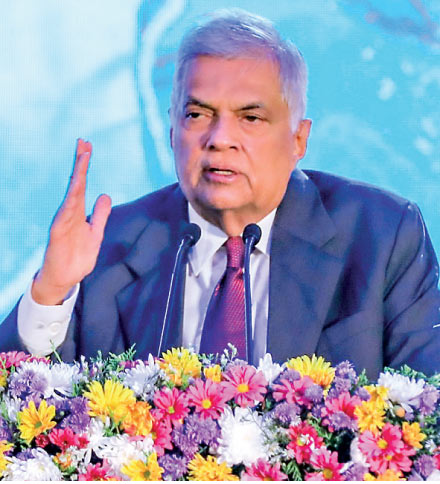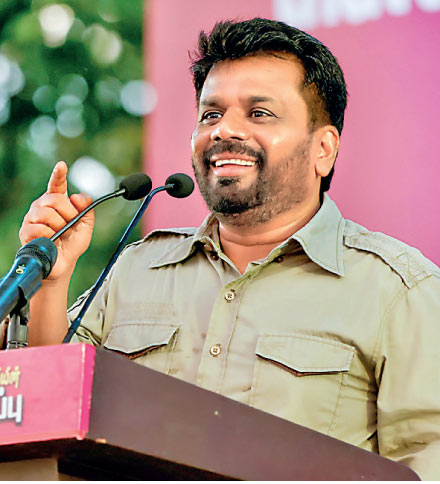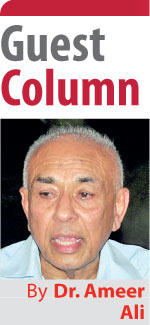Monday Feb 16, 2026
Monday Feb 16, 2026
Thursday, 28 December 2023 00:10 - - {{hitsCtrl.values.hits}}

President Ranil Wickremesinghe

NPP Leader Anura Kumara Dissanayake
|
 President RW and his policy makers have decided to lead the economy along the IMF path come what may. But unlike in the previous 16 times whether they would go all the way to the end with the hope of utilising the promised
President RW and his policy makers have decided to lead the economy along the IMF path come what may. But unlike in the previous 16 times whether they would go all the way to the end with the hope of utilising the promised
$ 2.9 billion EFF fund is doubtful. There are three reasons for this pessimism.
Firstly, the availability of the full amount hinges on implementation of certain vital reforms recommended by IMF, like structural changes and clean democratic governance. These reforms are easy to recommend but difficult to implement given the prevailing political culture of Sri Lanka. RW has to compromise with the substance and coverage of these reforms for reasons of political survival.
Secondly, the economic pain associated with IMF recipe is born disproportionately and in ascending order by the middle, lower and lowest income groups so that it would become politically impossible to travel the whole distance with IMF in spite of draconian measures to control an open revolt. The so-called income support currently operating under RW’s aswesuma project is hardly sufficient to ease that pain.
And thirdly, is the external factor. The global economy trapped by two wars and repeated climatic disasters is facing multiplicity of supply constraints that are driving cost-push inflation and making ordinary business of market exchange hazardous and costly. To the economy of Sri Lanka operating in the open free-market arena, post-pandemic recovery from financial bankruptcy through a robust external sector would be extremely challenging. In his politically motivated ideal to transform the economy into an export-oriented miracle by 2048 RW has grossly underestimated the problems arising from outside the country.
IMF cannot create wonders. It doesn’t have a magic wand to bring prosperity. To start with, that institution was specifically created to be a watchdog of the post-World War II capitalist order. But, since the end of the Cold War in 1980s that order has financialised the world economy to such an extent that not only the world financial system has become crisis ridden but also that the real sector has fallen prey to financial crises. But IMF has no control over financialisation, but it helps to promote it. Thus, as expected, IMF started Sri Lanka’s recovery process by stabilising the financial sector.
The argument is ideological and based on a belief that a strong financial sector would pull the real economy out of its doldrums and set it on growth path. But economic history teaches otherwise. The finance sector originated to play a secondary role to make exchange easier for participants in the real sector. What Sri Lanka needs therefore is a massive injection of resources to revitalise the real sector so that at least the immediate needs of the vast majority of people could be satisfied at affordable prices. Small and medium scale enterprises competing freely in the market without being hijacked by mafia and corporate elements should be the backbone of this revitalisation process and should be given priority of attention by authorities via cheaper finance, skilled labour and appropriate technical knowhow. Has any of the competing parties any plan for this radical change although NPP keeps talking about it?
Among the contestants to the top job circulating in the media none except AKD seems to question the appropriateness of the IMF program to create what he calls a social revolution, which really means transformation of the political culture and economic ideals of the old order. IMF too realises, if one cares to read its report, that Sri Lanka’s crisis is broader and deeper than just economic misery. For instance, its recommendation to reform governance is almost an endorsement of AKD’s call for social revolution. Hence, it is implied that no amount of funds and advice from IMF or any other international agencies or for that matter from friendly countries is going to turn the tide unless the old order and its socio-economic and political apparatus are thrown out.
This is the challenge facing the country at this juncture. But none of the opposition parties except NPP is addressing this issue. Instead, the focus of attack against RW and his regime is centring on tax increases and rising cost of living. But these are unavoidable consequences of surrendering the recovery effort to the dictates of IMF.
On taxes, is there a better example to demonstrate the hypocrisy and crass political opportunism of a party leader than Mahinda Rajapaksa of SLPP who after voting in the Parliament to increase the VAT from 15 to 18%, now preaching to the public that taxes should be lowered and the reasons for it are based on sound economic principles? In Sri Lanka’s case, having allowed for decades budget deficits to balloon out of control to bury the country in foreign debt and financial bankruptcy there is no other way than to increase taxes to prune the deficit. But the question is who should bear the main brunt of that burden?
IMF wants the moneyed class not to be burdened with higher taxes, because according to its philosophy that class is the vanguard of economic recovery. On the contrary, it is this rentier class with its conspicuous consumption and influence over politicians that has hijacked the commanding heights of the economy to enrich itself at the expense of the masses. Will the tax department for instance, reveal to the public whether the highest income earner in the country is also the highest tax payer? RW’s resolve to improve tax collection under the present system may catch the small dodger but not the big shark. Because, as Veblen argues, “The thief or swindler who has gained wealth by his delinquency has a better chance than the small thief escaping the rigorous penalty of the law”. Doesn’t Pandora Papers prove this? This is why NPP’s social revolution becomes imperative.
Whichever the election that comes first in 2024, that election is going to be a contest between two ideological camps. One would like to continue with the old order and allow IMF to direct the recovery process, and the other would like to remove the old order, allow IMF to play a secondary role and lead the recovery process along a different trajectory. The only party that dominates the second camp is NPP. It wants a new order based on secular democracy with a new constitution and an economy that is more self-reliant with a robust real sector. That economy should be a market friendly economy and not a closed economy, but the market must operate within the parameters set by the new order. This is not a novelty to be tried anew.
In fact, the Chinese leaders after Mao set to remake their Communist model with more room for market forces and called theirs a ‘bird-cage economy’ in which the bird was the market and cage their economic plans. The bird was allowed to fly but only inside the cage. Today, that economy is world’s largest depending on how one does the ranking. NPP’s social revolution and economic agenda resemble that mixed model. Will the voters give NPP a chance to deliver? There is always the fear of the unknown. But nothing gained if nothing ventured.
(The writer is attached to Murdoch Business School, Murdoch University, W. Australia.)